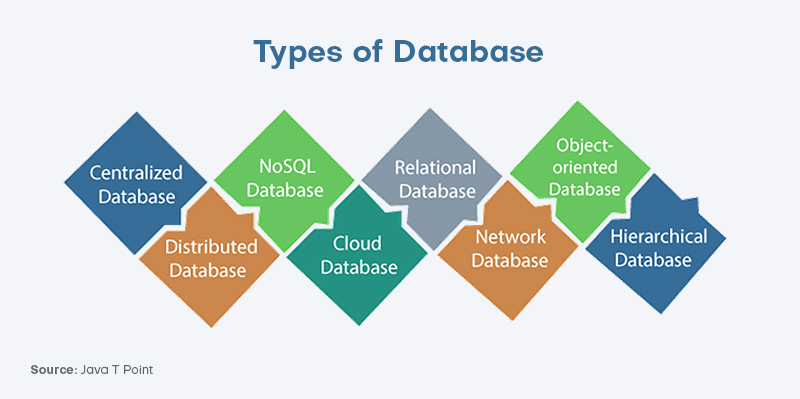Cloud computing has taken a sharp turn in recent years and has advanced rapidly. The cloud, previously solely accessible to huge firms, is now extensively employed by companies of all kinds, balancing the competitive landscape. The cloud excels at discreetly storing data. Hence, more and more companies are opting to migrate and store their crucial data from on-prem locations to the cloud.
Numerous benefits of the cloud include the capacity to perform extensive operations at a low cost while raising overall service quality. Additionally, a move to the cloud may result in improved security, less chance of data loss, and many other advantages that support the competitiveness of contemporary businesses. Here are a few of the main justifications for why a company needs to think about moving its database to the cloud. But before that, we need to understand a little more about the cloud database.
What is a cloud database?
So, how are cloud databases different from traditional ones? Simple. Unlike traditional databases, cloud databases don’t require a full-fledged setup or infrastructure upkeep. Cloud, as we know, executes the cloud databases. Data is increasingly being kept explicitly over clouds, sometimes referred to as virtual environments, whether in a hybrid cloud, public cloud, or private cloud. A database designed or optimized for such a virtualized environment is known as a cloud database. Many other advantages of a cloud database include paying for storage space and bandwidth according to a user’s requirement. We will discuss more advantages in the article.
Types of cloud database environment
Based on data types, there are various types of databases:
- Centralized database
- NoSQL database
- Cloud database
- Distributed database
- Relational database
- Network database
- Object-oriented database
- Hierarchical database

In this article, out of all databases, we will look deeper into the cloud database. The traditional cloud model and Database-as-a-Service (DBaaS) are the two main cloud database environment models.
- Traditional cloud model: In this cloud database model, the content database is hosted on the infrastructure of the specific business, and the IT manager and team are in charge of any supervision.
- DBaaS is supported by the service provider’s infrastructure, which is also responsible for any hiccups or errors. The user may fully concentrate on corporate objectives, operations, and development.
When should you use cloud databases?
Traditional databases and cloud databases both function well in most situations. In particular, they are useful for creating software solutions that:
- Require a significant amount of data.
- Native to the cloud.
- Need to manage heavy traffic.
- Spatially scattered.
- Real-time transaction processing, legacy database migration, the creation of mobile applications, the Internet of Things, caching, and analytics are some growing applications for fully-managed databases.
Top Five Reasons to Migrate Database to Cloud Right Now
If you’re picking the finest Database-as-a-Service for your needs or are still unsure whether a cloud database is the right solution for you, there are a few more crucial factors to consider:
Cost savings
Since cloud computing operations require less army and physical space than traditional computer methods, database transfer to the cloud can drastically reduce a company’s costs. Additionally, moving to a cloud database reduces the need for expensive tools, specialist equipment, and other resources to manage and maintain complicated IT infrastructures. Database cloud migration eventually results in lower construction expenses as well as lower running costs for HVAC and electricity.
Flexibility
When you move a database to the cloud, you can scale it up and down more quickly. Further, more elasticity and flexibility are offered by cloud computing. Dynamic scalability is made possible via cloud database migration, allowing for the creation of extra database instances to accommodate shifting application loads.
Working with a DBaaS enables seamless and easy scaling during busy periods or before significant releases with short deadlines. Growing businesses that might not have the funds or resources for on-premise infrastructure would greatly benefit from this.
Reduced on-prem dependence
On-premises storage might not be ideal for your organization since it necessitates more IT assistance, conformity to regulatory requirements, increased maintenance expenses, a higher initial capital investment, increased threat of data loss, and restricted scalability.
Companies may now spend less on hardware and resources, as well as IT expenses because the cloud service provider takes care of the infrastructure and maintenance elements. Additionally, some fewer difficulties and disputes frequently obstruct progress.
Security
Physical theft prevention is time- and money-consuming. To fully protect your on-premises servers, you must employ strict security measures, such as guards, intrusion detection systems, and secured servers’ cells.
Your time and money spent on all of the stuff vanish in the cloud. Cloud providers cover the cost of 24-hour guards and cutting-edge physical security measures. The scale and security of these data centers almost exclude the possibility of targeted physical theft.
The suppliers of cloud solutions take care of improved security and protect you from the possibility of receiving unsolicited traffic or losing your data. They also guarantee that automated security upgrades are impervious to security risks. Similar to the previous benefits, all leading suppliers now pay attention to security and invest in the top available solutions to protect the databases. It is proven to be safer to safeguard sensitive data and information with fewer mistakes.
Disaster recovery
The usage of the cloud to implement a reliable disaster recovery strategy is becoming more widespread. The complete virtual server may be backed up or transferred via cloud computing to an off-site data center. The virtual host may spin up the virtual server in a few minutes. This benefit is that data may be correctly and securely transported across data centers without having to reload each server component individually. Disaster recovery is, therefore, far more cost-effective, and recovery times are considerably reduced.
Equipped with new technology
Because updated infrastructure is the cloud vendor’s problem (and exclusive obligation), businesses no longer need to worry about purchasing new technology. Companies also don’t need to engage specialized personnel for onboarding and training.
Conclusion
For many businesses, choosing the cloud for data storage is a fantastic solution since it offers economic advantages in addition to practical ones like routine data backups and simple scaling. Besides, cloud databases are a great alternative to on-prem data storage for your company since they may reduce the workload on your IT team, eliminate capital expenditures, fit within your budget, carry out routine data backups, and fit with your specific demands.

